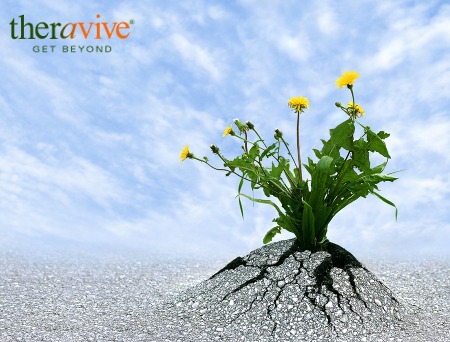 For most of us, meeting with misfortune and struggle is a part of life. In fact, surviving adversity is often viewed as beneficial and necessary. According to one Danish Proverb: “A gem cannot be polished without friction, nor man be perfected without trials.” When a person survives life’s difficulties and demonstrates the ability to withstand all of the stress that goes along with it, he or she is described as “resilient”. The Oxford Dictionary defines resilience as “The ability of a substance or object to spring back into shape.”
For most of us, meeting with misfortune and struggle is a part of life. In fact, surviving adversity is often viewed as beneficial and necessary. According to one Danish Proverb: “A gem cannot be polished without friction, nor man be perfected without trials.” When a person survives life’s difficulties and demonstrates the ability to withstand all of the stress that goes along with it, he or she is described as “resilient”. The Oxford Dictionary defines resilience as “The ability of a substance or object to spring back into shape.”
People are not born resilient. The various factors that promote resilience (feeling in control of oneself, having a positive view of the world, managing strong feelings and impulses, having good problem-solving and communication skills, coping with stress in healthy ways while avoiding harmful coping strategies such as alcohol abuse, seeking help and resources as well as helping others) come from skills learned over time. Piero Ferrucci in his book “Your Inner Will” states: “Resilience is not merely adaptation. It is a way of strength. And resilient people who survive a misfortune do not remain the same. They have a richer notion of their own powers. They have developed new faculties. They have seen a different dimension of life — and they are wiser.” (Ferrucci, 2014, pg. 154) Thus, resiliency is not a personality trait but something a person learns over time.
Resiliency Research
Within the field of psychology, interest in resilience grew when Post-Traumatic Stress Disorder (PTSD) became a formal diagnosis in the DSM-III, a psychological reference that was first published in 1980. Since that time, researchers have uncovered surprising data: not everyone exposed to trauma develops PTSD. In fact, most individuals do not. Therefore, what protects people from this diagnosis? Although certain biomarkers point to genetic factors, a host of psycho-social factors also contribute to resiliency. Steven Southwick states: “When we began our study, we assumed that resilience was rare and resilient people were somehow special, perhaps genetically gifted. It turns out we were wrong. Resilience is common and can be witnessed all around us. Even better, we learned that everyone can learn and train to be resilient.”(Southwick, 2012, para. 4) Thanks to research we now understand that people can improve their capacity for resilience during any time of their life.
Resilience and Social Support
One important factor in the development of resilience is social support. Caring for others and having a healthy a social network is essential to bouncing back from adversity. There is a direct correlation between one’s ability to connect with others and the level of optimism that people feel. Middle-aged people who have at least one person to depend on also have better overall health, and married people are less vulnerable to depression than individuals who remain single.
Christian Moore, author of the “Resilience Breakthrough” writes: “When you have relational resilience you draw strength from the emotional support of friends, family members, deceased loved ones, a pet, or even a stranger who smiles your way. These support systems can come from simple or in depth interactions.” (Moore, 2014, pg. 55) Moore goes on to say that relationships are the fuel for helping people stay off drugs, stay in school, and bounce back from job loss.
Many people find themselves coping with adversity through the use of faith and prayer; this resiliency factor is also connected to relational support. Individuals feel a sense of reciprocity when they pray or meditate. People who define spirituality as important also describe the sensing of an internal presence/higher power being that is there for them, especially during lonely times.
In fact, social support seems to be connected to many of the other resiliency factors listed. Good problem-solving abilities and healthy communication skills are harder to achieve unless a person first has a solid support system on which to practice. Concomitantly, trusted and valued relationships need to exist before an individual can feel safe to share feelings as well as express wants and needs. Lastly, social connections are a motivating force behind regulating strong feelings and impulses.
Challenges to Social Resilience
Unfortunately, as important as social supports are in promoting and maintaining resiliency, it’s becoming more of a challenge to develop them. In June 2006 a study in the American Sociological Review reported that most American adults had only two close friends. In this same study, one out of every four individuals reported that they had no one to discuss important matters with. There are a number of reasons for this. One major influence is modern technology. “The average American spends at a minimum eight and a half hours a day in front of a screen, and sometimes more than one screen at a time, as we are often on our computers while watching television.” (Moore, 2014, pg. 81) Today, it seems, people are more apt to turn toward a screen in order to connect than toward another person in the flesh. Modern technology has also enabled individuals to become increasingly mobile (an American will move an average of 11 times in his or her lifetime). Thus, living among a contingent of extended family members or in cohesive neighborhoods is no longer the norm and Americans have become more dependent on the nuclear family than community organizations, clubs, or neighborhoods. Businesses unwittingly contribute to this increase in isolation by allowing individuals to work from home. Computers have made this possible. There is also more incentive to work from home as industries recognize potential savings to over-head costs. Another barrier to social networking is time. The rise in unemployment has caused significant down-sizing within companies, creating longer work hours for those individuals who remain employed. Thus, as isolation has taken over, individuals are compensating by becoming more tightly connected to their immediate family members.
Within the realm of psychotherapy, computer technology has also had an impact on the weakening of social supports. Although the use of support groups has been a mainstay in the helping professions, the popularity of face-to-face support groups are giving way to larger online support groups where members can ‘post’ comments, thus trading intimacy for the sake of ease (one doesn’t have to leave home to partake) and convenience (no one has to search for a physical place to house the group). With community support groups and neighborhood clubs becoming harder to find, it is not unusual for clients to consider a therapist to be their main or only support system.
It’s time for those in the mental health field to place more value on building social supports. To view its worth, one only has to see the connection between the social isolation of a typical active shooter and the rise of school shootings such as the one that occurred in Newtown, Connecticut. A group called Everytown for Gun Safety recently came out with a statistic. Between December 2012 and June 2014, fifteen school shootings were reported similar to the tragedy seen at the Sandy Hook Elementary School, bringing the average to one shooting every five week.
The Global War on Terrorism is entering its fourteenth year. The kidnappings, beheadings and bombings conducted by such terrorist organizations as Al-Quaeda, Isis, and Boko Haram show little sign of slowing down. Concomitantly, the growth of poverty, divorce, mental illness, and homelessness are stretching community resources and creating daily hardship for a large number of citizens. Signs of adversity and trauma continue to be ever present in today’s society.
In his book “The Resilience Breakthrough”, Christian Moore recommends putting down our electronic devices from time to time in order to reconnect emotionally to others. Although the invention of Facebook and Twitter has helped to facilitate a flow of ideas between people who are physically distant from one another, modern technology has compromised our ability to emotionally connect, and that emotional connection cannot be overlooked. When it comes to social support, there is something to be said about the importance of reading faces, hearing another person’s voice or being able to touch an arm or hand as a way of providing comfort.
References
Moore, Christian (2014) The Resilience Breakthrough, Austin, Texas, Greenleaf Book Group Press
Ferrucci, Piero (2014), Your Inner Will: Finding Personal Strength in Critical Times, New York, New York, Jeremy P. Tarcher/Penguin
What Is Resilience |This Emotional Life (2009) Retrieved from http://www.pbs.org/thisemotionallife/topic/resilience
Fantz, Ashley, Knight, Lindsey, Wang, Kevin A Closer Look: How Many Newtown-like School Shootings since Sandy Hook (2014) Retrieved from http://www.cnn.com/2014/06/11/us/school-shootings-cnn-number
Cooper, Jackie, Herring, Lee Americans’ Circle of Friends Is Shrinking (2006) Retrieved from http://www.asanet.org/press/20060616.cfm
Southwick, Steven The Science of Resilience (2012) Retrieved from http://www.huffingtonpost.com/steven-m-southwick/trauma-resilience
About the Author

Alicia Meade
, MA, LCSWI've helped individuals find solutions to their problems for over 30 years and am skilled in working with children, adolescents and families. I have worked in many different systems throughout the years: mental health centers, inpatient hospital settings, alternative schools, the legal system and managed care. As a therapist I am solution-focused and use aspects of cognitive behavioral therapy (CBT) and dialectical behavioral therapy (DBT). My approach is interactive and nonjudgmental.
Office Location:
1010 Lake St, Suite 620
Oak Park, Illinois
60302
United States
Phone: 630-747-1312
Contact Alicia Meade
Professional Website:
www.aliciameade.com